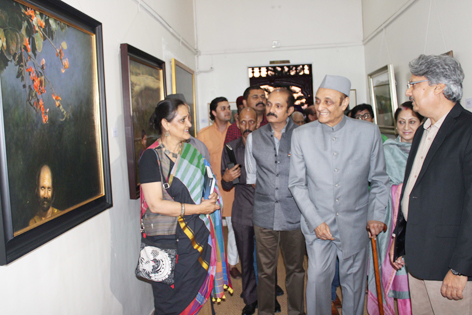Amar Mahal hosts Suman Gupta’s art works
Excelsior Correspondent
JAMMU, Oct 20: Terming Dogra culture quite enriched and stressing for conservation of the same, former Sadar-e-Riyasat and scion of the erstwhile Royal Dogra family, Dr Karan Singh today appealed people of Duggar land to keep politics away from the agenda of cultural promotion.
Click here to watch video
“Dogra culture, Dogri language, our folk songs, dance and local art etc are quite enrich, which must be kept in high esteem and further promoted,” he said while opening door to the mystical world of Suman Gupta’s creations “Sacred Vision’ – an exhibition of his recent works at Amar Mahal Museum and Library Jammu, here today.
Recalling the velor of Dogras, Dr Karan Singh said that heroic courage and bravery of the Dogra soldiers is a historic fact and known to everyone but at the same time, the cultural pride of Duggar land is also need to be propagated and kept in high esteem.
“Dogras extended borders of India and everyone knows how General Zorawar Singh and his soldiers from Kandi belt of Jammu fought the battles at the places where one can’t easily reach even today for forming the State of J&K, which did not come into existence by chance but with the heroic courage and bravery of our people,” he said.
Reiterating that like accounts of heroic courage and valor of the Dogra soldiers, the rich culture of Duggar land also needed to be preserved and admired with passion, Dr Karan Singh stressed for keeping the agenda of cultural promotion above the politics.
“Preserve your culture, language, folk dance, art and principals with dignity and honour by keeping our culture above the game of politics, which is chaotic and will remain so as I have spent so many years in political life and hence know much about the same,” he opined.
The Amar Mahal Museum and Library held a weekend dedicated to the revival of syncretic cultures, launching redesigned museum galleries and hosting presentations by Dara Shikoh Fellows on topics ranging from shared sacred spaces in Bhaderwah to the revival of Gojri in the digital age.
The Museum launched its redesigned galleries on the history and culture of Jammu alongside a gallery dedicated to a rare collection of 49 Nala-Damayanti miniature paintings. There was also an exhibition of paintings by contemporary artist Suman Gupta on “Sacred Vision.” The evening also saw music performances in Hindi, Urdu, Dogri, Pahari, and Gojri by musicians from Jammu and Poonch.
The paintings by Dogri-Pahari artists depict narrations from Sriharsha’s 12th-century work, Naishadhacharita, and are an integral part of Jammu’s cultural history. Renowned art historian B N Goswamy has authored a book on them and they have inspired several contemporary artists across the world.
Yesterday, the annual symposium of the fourth annual Dara Shikoh Fellowship was held in the historic library premises and was attended by Dr Karan Singh, Professors from Jammu University and renowned scholars from across the city. Four Fellows, two from Srinagar and one each from Kishtwar and Poonch, showcased their academic and cultural research into the syncretic culture of Bhaderwah and its lessons for communal harmony in the region.
Khalid Yaqoob Mir, a Ph D. student from Kishtwar, presented his work on Sufi shrines of Peers in Bhaderwah; Taha Mughal, an architect with INTACH Kashmir, introduced his translation of Bashir Bhaderwahi’s book on the history of the region; Garima Sharma, an MA student from Poonch, showcased her findings on the revival of Gojri; and Tabish Haider, an artist from Srinagar, displayed his painting on the Naga culture of Bhaderwah.
The Fellowship, currently in its fourth year, has supported several young minds from across the region and abroad to pursue research in Jammu, Kashmir, and Ladakh. The symposium saw closing remarks by Dr Jyotsna Singh, the Director of the Dara Shikoh Centre for the Arts, and Anish Gawande, the Director of the Dara Shikoh Fellowship.


